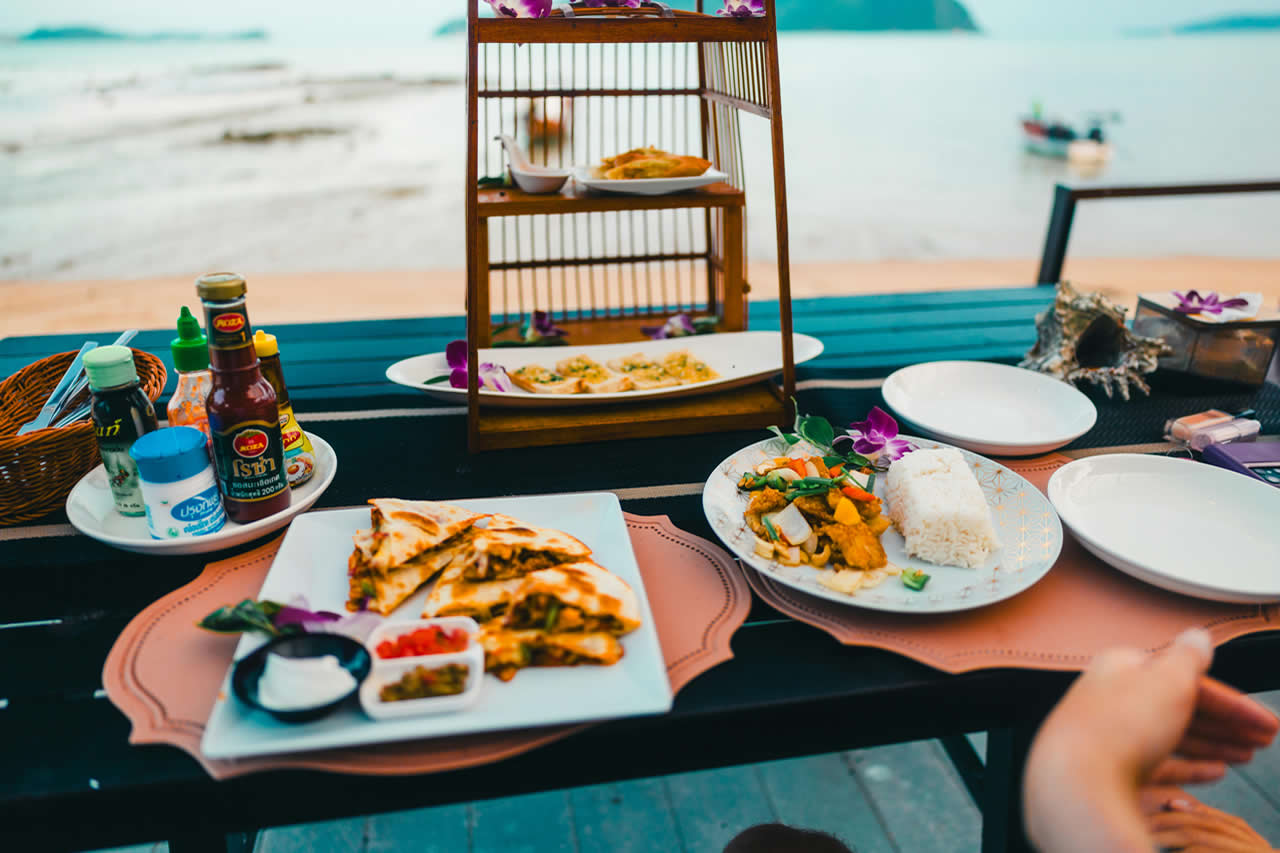Thailand is truly an affordable country to live in when compared to most Western countries and even other Southeast Asian nations. Obviously, the cost of living in Thailand varies depending on your lifestyle, location, and spending routine. But how much does it really cost to live here? Here’s a detailed breakdown of living expenses in Thailand.
Rent – Accommodation
Rent is one of the biggest factors affecting your budget. Costs vary by city, neighborhood, and property type.
Bangkok
Bangkok’s rental market varies greatly by area. Modern one-bedroom condos in central locations like Asok, Phrom Phong, or Silom usually cost ฿15,000–฿40,000, while suburban areas such as On Nut or Lat Phrao offer good options from ฿8,000–฿20,000. Houses in gated communities around Bang Na or Ramintra start around ฿30,000 and can exceed ฿100,000+ depending on size and amenities.
Chiang Mai
Condos typically range ฿7,000–฿20,000 in popular areas like Nimman, Santitham, and the Old City, while larger houses in Hang Dong, Doi Saket, or Saraphi cost ฿15,000–฿40,000 depending on size and amenities. The city is especially popular with remote workers thanks to its café culture, walkability, and mild cost of living. Long-term renters often choose neighborhoods slightly outside the center for better value and more space.
Hua Hin
A favorite among retirees and long-stayers, Hua Hin offers condos from ฿10,000–฿30,000 in areas like Khao Takiab, Hua Hin Center, and Cha-Am. Houses with private gardens or small pools range ฿20,000–฿50,000+, especially in gated communities such as Mali Prestige or Red Mountain. Prices remain stable year-round, making Hua Hin predictable for long-term budgeting.
Phuket
Phuket commands higher prices, particularly in beach zones like Patong, Kata, and Kamala. Condos typically range ฿15,000–฿50,000+, with steep increases during high season. Houses and villas in areas like Rawai or Cherng Talay can run ฿30,000–฿100,000+, driven by tourism demand and luxury developments. Long-stay expats often choose Rawai for better value.
Pattaya
Pattaya offers a wide range of rental options, from central condos around Central Pattaya at ฿10,000–฿40,000, to quieter beachfront units in Jomtien at slightly higher prices. Houses in villages around East Pattaya or Pratumnak Hill cost ฿20,000–฿60,000 depending on size and amenities. Pattaya remains one of the most cost-flexible coastal cities.
📌 Thinking about living near the beach?
Explore my full Pattaya Travel Guide for neighborhoods, beaches, and what to expect before choosing an area to rent in.
Krabi
A middle-ground option compared to Phuket and Koh Samui. Long-term rentals around Ao Nang and Klong Muang start from ฿10,000–฿20,000 for modern condos, while houses range ฿18,000–฿45,000 depending on distance to the beach and season. Railay itself has no long-term housing, but many expats choose Krabi Town or Ao Nang for a balance of cost and lifestyle.
📌 Curious what life in Krabi actually feels like?
See my complete Krabi Travel Guide for beaches, areas to stay, costs, and what long-term renters can expect around Ao Nang and Klong Muang.
Koh Samui
Samui’s rental prices vary sharply by area. Condos near Chaweng or Fisherman’s Village range ฿12,000–฿50,000+, while hillside villas and pool homes in Lamai, Mae Nam, or Bang Por start around ฿25,000–฿100,000+. Expect seasonal fluctuations, with peak periods raising prices significantly for short-term contracts.
📌 For information regarding renting read my guide: How to Rent a Condo or House in Thailand: Everything Expats Need to Know
Utilities
Utility costs in Thailand depend on your lifestyle and location. Here’s what to expect:
Electricity
Electricity is billed by the Provincial Electricity Authority (PEA) at a tiered rate, with the average cost around ฿4–฿6 per kWh.
- Air Conditioning: Running a single 9,000-12,000 BTU AC unit for 8 hours per day can cost ฿800–฿1,500 per month. If you run multiple AC units for extended hours, your bill can climb significantly.
- Condos & Small Apartments: Expect to pay ฿800–฿2,500 per month if you use AC sparingly.
- Houses with AC Use: Monthly bills can range from ฿3,000–฿8,000 depending on usage and house size.
- House with a Swimming Pool: Pool pumps and filtration systems run ฿1,500–฿3,000 per month, bringing total electricity costs for a house with a pool to ฿5,000–฿12,000+, especially with heavy AC use.
Water
- Apartments & Condos: ฿100–฿300 per month.
- Houses: ฿300–฿800, depending on lawn irrigation and pool maintenance.
Gas (for Cooking)
Gas is primarily used in houses, as most condos have electric stoves.
- A standard 15 kg LPG gas bottle costs around ฿350–฿500 and lasts 1–3 months, depending on cooking frequency.
- Restaurants or frequent home cooks may go through a bottle in 1 month, while occasional users may stretch it to 3 months.
Garbage Collection
- Generally included in rent for condos and apartments.
- Houses may have a separate charge of ฿50–฿100 per month, payable to the local municipality.
Internet – Phone – TV
Staying connected in Thailand is relatively affordable, with high-speed internet, mobile plans, and streaming services available.
Home Internet
Thailand has excellent fiber-optic internet with speeds up to 1 Gbps. The major providers include:
- AIS Fibre: Plans start at ฿599/month for 500 Mbps and go up to ฿1,499/month for 1 Gbps.
- True Online: Offers similar packages, with ฿799/month for 1 Gbps download / 500 Mbps upload.
- 3BB: Plans start at ฿590/month for 1 Gbps, with premium plans reaching ฿1,200–฿1,500/month.
Most providers offer bundled deals, including TV services and mobile discounts.
Mobile Phone Packages
Thailand has three major mobile providers: AIS, TrueMove H, and dtac.
- Prepaid SIM Cards: Start at ฿50–฿100, with unlimited data options from ฿150–฿500 per month.
- Postpaid Plans:
- Basic: ฿399–฿599 (15–30 GB data, unlimited calls on the same network).
- Mid-Range: ฿799–฿1,099 (100+ GB data, unlimited calling).
- Unlimited Data: ฿1,099–฿1,499 per month.
📌 Tourists and short-term visitors can opt for 7-day tourist SIMs with unlimited data for ฿299–฿599.
TV Services
Traditional cable TV is becoming less popular, with most expats opting for streaming services.
- TrueVisions (Thailand’s main cable provider): Packages range from ฿299–฿2,500 per month, offering international news, sports, and movie channels.
- AIS Play & 3BB TV: Offer streaming bundles with internet subscriptions.
- IPTV Services: Many expats use IPTV for international channels, costing ฿1,500–฿3,500 per year, depending on the provider.
Streaming Services
Streaming is widely used, and most international services are available.
- Netflix Thailand:
- Basic: ฿99/month (mobile only)
- Standard: ฿379/month (HD, 2 devices)
- Premium: ฿419/month (UHD, 4 devices)
- Disney+ Hotstar: ฿499/year (Thai version, limited Western content)
- Amazon Prime Video: ฿149/month
- YouTube Premium: ฿159/month
- Spotify Premium: ฿139/month (individual), ฿219/month (family plan)
📌 For Western expats, VPN services (฿100–฿300 per month) may be required to access region-restricted content.
Food – Groceries – Eating Out
Local Markets vs. Supermarkets
- Local Markets: Fresh produce is significantly cheaper. A kilogram of chicken costs ฿60–฿80, pork ฿80–฿120, and eggs ฿3 per piece. Fruits and vegetables are incredibly affordable, with bananas at ฿20 per bunch, mangoes ฿40–฿80 per kg, and leafy greens ฿10–฿20 per bundle.
- Supermarkets (Big C, Tesco Lotus, Tops, Villa Market, Gourmet Market): Imported products are expensive. A block of cheese costs ฿250–฿500, a bottle of wine ฿500–฿2,000, and cereals ฿150–฿300.
Eating Out
- Street Food: Affordable and delicious. Popular dishes include:
- Pad Thai: ฿40–฿70
- Som Tam (Papaya Salad): ฿40–฿60
- Khao Man Gai (Chicken & Rice): ฿40–฿60
- Moo Ping (Grilled Pork Skewers): ฿10–฿20 per stick
- Mango Sticky Rice: ฿50–฿80
- Thai Street Food including Must-Try Dishes
- Mid-Range Restaurants: Expect to pay ฿300–฿800 for a Thai meal for two. Western meals range from ฿500–฿1,500.
- Fine Dining: Upscale restaurants start at ฿2,000+ per meal, especially in tourist-heavy areas like Bangkok and Phuket.
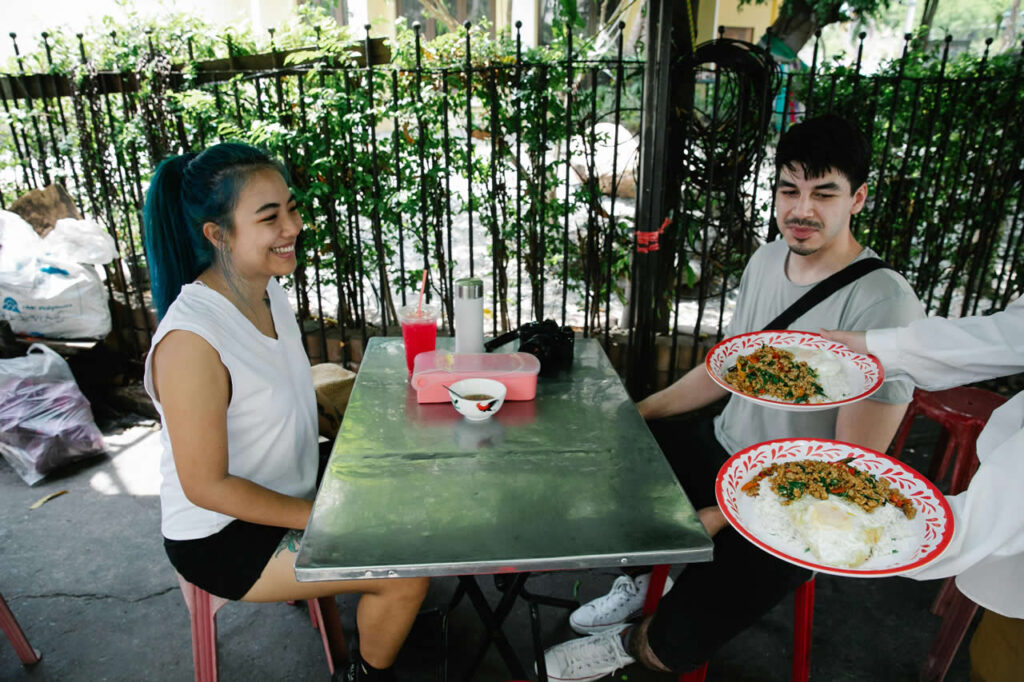
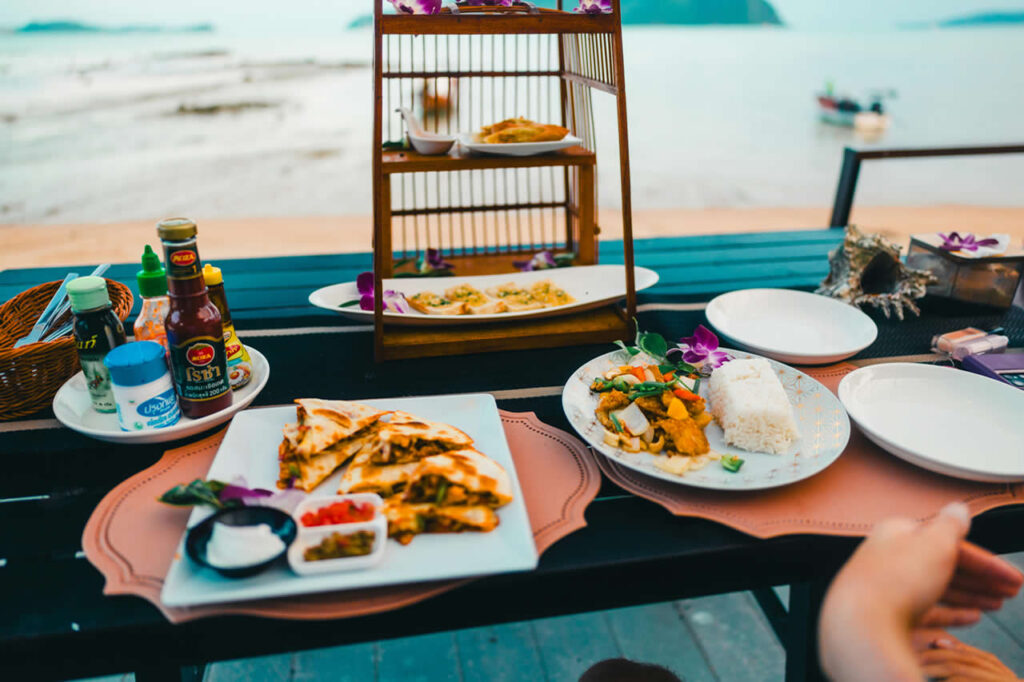
Transport
Getting around in Thailand varies depending on the city and your personal preference.
Public Transport
- Bangkok: The BTS Skytrain and MRT Subway cost ฿16–฿59 per ride, with monthly passes starting at ฿1,400.
- Chiang Mai, Pattaya, Phuket: Public transport is limited to songthaews (shared taxis) for ฿20–฿50 per ride.
Taxis & Ride-Sharing
- Taxis: Start at ฿35, with fares around ฿100–฿500 for most city trips.
- Grab: Prices vary, but expect to pay ฿100–฿300, depending on distance and demand.
Vehicle Rentals
- Scooter Rental: ฿150–฿350 per day, or ฿2,500–฿5,000 per month.
- Car Rental: ฿800–฿2,000 per day, or ฿15,000–฿50,000 per month.
Purchasing a Vehicle
- Motorbike (Honda Click, Yamaha NMax 155): ฿50,000–฿100,000.
- Bigger Motorcycles (Kawasaki, Honda CB500X): ฿200,000+.
- Used Cars (Toyota Vios, Honda Jazz): ฿200,000–฿500,000.
(Thinking of buying secondhand? Read my full guide on how to buy a used car or motorbike in Thailand.) - New Cars (Toyota Corolla, Honda Civic): ฿800,000–฿1,500,000.
- Luxury Cars (BMW, Mercedes, Lexus): ฿3M+.
Owning a vehicle requires insurance (starting at ฿5,000 per year for basic coverage) and annual road tax (around ฿1,500–฿10,000, depending on engine size).
Check out our in-depth guide on importing vehicles into Thailand—covering taxes, legal steps, and real-world costs.
Clothing
The cost of clothing in Thailand depends on where you shop. You can find budget options at markets, mid-range choices in malls, and luxury or tailored clothing for higher prices.
Markets & Street Vendors
- T-shirts: ฿100–฿300
- Shorts: ฿150–฿400
- Dresses: ฿200–฿600
- Flip-flops: ฿50–฿200
Shopping Malls & Retail Stores
- Uniqlo, H&M, Zara: T-shirts from ฿300–฿800, jeans ฿1,000–฿2,500, and dresses ฿800–฿3,000.
- Department stores like Central and Robinson: Expect slightly higher prices, with shoes ranging from ฿1,500–฿5,000.
Export Shops & Factory Outlets
You can find discounted name-brand clothing at outlet malls like Premium Outlet in Bangkok and Pattaya. Prices can be 30–50% cheaper than retail.
Luxury & Designer Brands
International brands like Gucci, Louis Vuitton, and Prada are available at malls like Siam Paragon and EmQuartier, but prices can be higher than in the West due to import taxes.
Tailor-Made Clothing
- Men’s suits: ฿3,500–฿15,000+, depending on fabric quality and tailor reputation.
- Women’s dresses: ฿2,000–฿10,000, depending on style and material.
- Shirts (custom-made): ฿800–฿3,000.
For high-quality tailoring, Bangkok’s Sukhumvit area and Chiang Mai’s Nimman district have reputable shops catering to expats.
📌 Still deciding where to live? Check my guide to the best places to live in Thailand for a side-by-side look at cost, lifestyle, and expat appeal.
Monthly Sample Budget for Living in Thailand
To help you get a realistic idea, here’s a breakdown of typical monthly expenses for different lifestyles—whether you’re living on a tight budget, enjoying moderate comforts, or going all out.
Living in Thailand can be incredibly affordable or as luxurious as you want it to be!
| Expense Category | Ultra-Cheap | Budget (Low) | Budget (Mid-Range) | Budget (High) |
|---|---|---|---|---|
| Rent – Accommodation | ฿4,000 (Shared room, outskirts) | ฿7,000 (Chiang Mai condo) | ฿20,000 (Bangkok condo) | ฿50,000+ (Luxury villa in Phuket) |
| Utilities | ฿1,000 (Fan only, shared bill) | ฿2,000 (Minimal AC use) | ฿4,000 (Moderate AC, house utilities) | ฿10,000+ (Large house with pool) |
| Internet – Phone – TV | ฿400 (Free Wi-Fi, prepaid SIM) | ฿600 (Basic fiber, prepaid SIM) | ฿1,500 (Fast internet, postpaid plan) | ฿3,500+ (Premium IPTV, 5G plan) |
| Food – Groceries – Eating Out | ฿5,000 (Street food, instant noodles) | ฿7,000 (Markets, street food) | ฿15,000 (Mix of home cooking & dining out) | ฿30,000+ (Imported groceries, fine dining) |
| Transport | ฿500 (Bike, walking) | ฿1,500 (Public transport, scooter rental) | ฿5,000 (Grab/taxis, personal scooter) | ฿15,000+ (Car ownership, frequent flights) |
| Clothing | ฿500 (Thrift stores, second-hand) | ฿1,000 (Markets, budget shops) | ฿3,000 (Shopping malls, mid-range brands) | ฿10,000+ (Tailor-made, luxury brands) |
| Entertainment | ฿1,000 (Free events, YouTube) | ฿3,000 (Bars, cinema, local outings) | ฿7,000 (Concerts, nightlife, live sports) | ฿20,000+ (VIP clubs, high-end experiences) |
| Sport | Free (Running, calisthenics) | ฿1,500 (Running, cycling, local gym) | ฿5,000 (Muay Thai, mid-range gym) | ฿15,000+ (Golf, premium fitness clubs) |
| Healthcare | ฿500 (Public hospital, cash visits) | ฿1,000 (Basic insurance, clinic visits) | ฿5,000 (Mid-tier insurance, private hospital visits) | ฿15,000+ (Comprehensive international insurance) |
| Nanny – Maid | Not applicable | ฿4,000 (Part-time cleaner) | ฿10,000 (Full-time maid) | ฿20,000+ (Live-in English-speaking nanny) |
| School Fees | Not applicable | ฿3,000 (Local Thai school) | ฿15,000 (Bilingual school) | ฿80,000+ (Elite international school) |
| Small Holidays | ฿1,000 (Local day trips, buses) | ฿3,000 (Weekend trip by bus) | ฿10,000 (Domestic flights & mid-range hotels) | ฿30,000+ (Luxury resorts, Koh Samui flights) |
| Miscellaneous | ฿1,000 (Thrift items, emergencies) | ฿2,000 (Unexpected expenses) | ฿5,000 (Shopping, extra activities) | ฿10,000+ (High-end shopping, memberships) |
| Total Estimated Monthly Budget | ฿20,000–25,000 | ฿40,000 | ฿100,000 | ฿300,000+ |
Note: The “Ultra-Cheap” column reflects a very minimalist lifestyle—shared housing, local food, limited comforts, and no frills. It’s realistic, but not for everyone. Likewise, not all categories apply to every expat. School fees, nanny/maid services, and holidays may be optional depending on your situation.
📌 One often overlooked factor in monthly budgets is how money is transferred into Thailand. Even small fees or exchange-rate markups can add up over time, which is why it’s worth understanding the cheapest way to send money to Thailand without losing it to hidden costs.
✅ Want to plan your own Thailand budget?
Download the Monthly Thailand Expat Budget Sheet as a PDF. It includes the full comparison table plus a blank version for you to fill in your own estimated costs.
Thailand Cost of Living Calculator – Plan Your Budget
Use this calculator to estimate your monthly living costs in Thailand. Plug in your lifestyle choices and see how your personalized budget adds up in real time.
Thailand Cost of Living Calculator
Choose your city, accommodation, and lifestyle to estimate your monthly costs in Thailand (THB).
✅ Want to compare your results with real examples? Download the Monthly Expat Budget PDF above to customize and keep your Thailand cost plan handy for easy reference.
📌 Managing income or sending money from abroad?
If your budget includes pensions, salaries, or savings from overseas, it’s important to avoid unnecessary fees and delays. Check out my complete guide to Banking & Financial Tips for Expats in Thailand for smart ways to handle transfers, set up Thai accounts, and stay financially secure.
Entertainment
Thailand offers a wide range of entertainment options to suit every budget, from free outdoor activities to high-end nightlife. Here’s what you can expect to pay across different locations.
Movies & Cinemas
- Standard movie ticket: ฿120–฿250 (weekday discounts available)
- VIP or first-class cinema: ฿500–฿1,500 (includes reclining seats and food service)
- IMAX ticket: ฿250–฿500
- Locations: Major cineplexes in Bangkok (Siam Paragon, CentralWorld), Chiang Mai (Maya Mall), Pattaya (Terminal 21), etc.
Bars & Nightlife
- Local beer at a bar: ฿80–฿160
- Cocktail at a mid-range bar: ฿200–฿400
- Entry to a high-end club: ฿300–฿1,000 (often includes a free drink)
- Bottle service at a nightclub: ฿2,500–฿10,000+, depending on the brand
- Locations: Bangkok’s Sukhumvit Soi 11, Pattaya’s Walking Street, Phuket’s Bangla Road
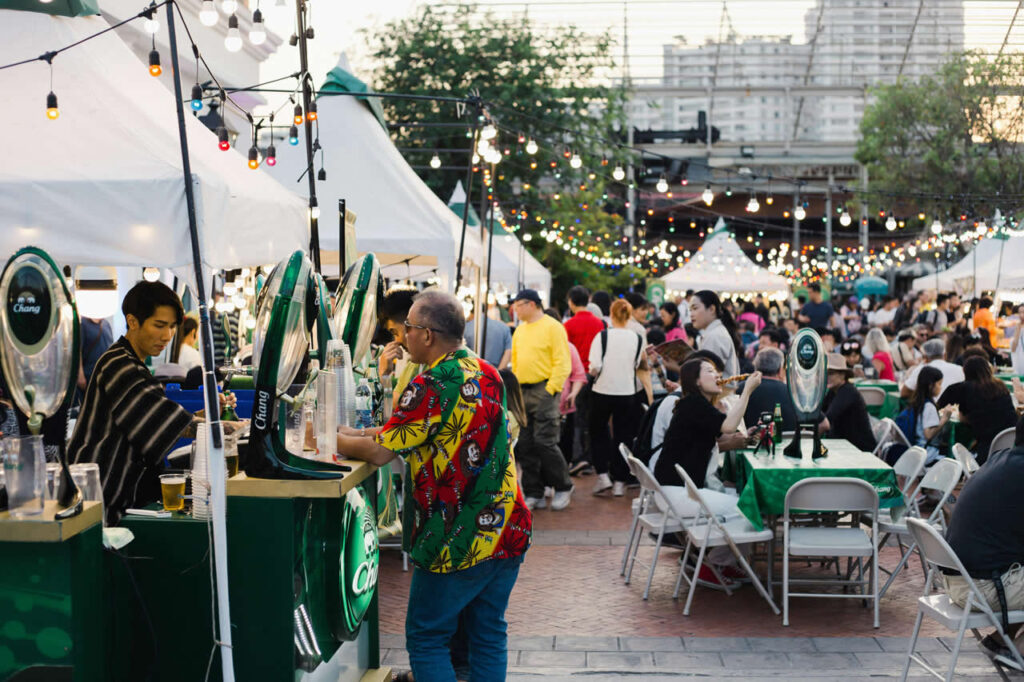



Live Music & Shows
- Local live music bars: ฿100–฿300 (free entry in some places, drinks extra)
- Muay Thai fights (tourist stadiums): ฿600–฿2,500
- Cabaret shows: ฿500–฿1,500 (e.g., Alcazar Show in Pattaya, Simon Cabaret in Phuket)
- Traditional Thai dance performances: ฿300–฿1,200
Outdoor & Adventure Activities
- National Park entry fee (foreigners): ฿100–฿400
- Scuba diving in Koh Tao or Phuket: ฿2,500–฿4,500 per dive
- Island-hopping tours: ฿1,000–฿3,000, including lunch
- Ziplining in Chiang Mai: ฿1,500–฿3,500
- Elephant sanctuary visit: ฿1,500–฿3,000, depending on location
Gyms & Fitness
- Basic gym membership: ฿800–฿2,500 per month
- High-end fitness centers (e.g., Virgin Active, Fitness First): ฿2,500–฿4,500 per month
- Muay Thai training: ฿300–฿800 per session, or ฿8,000–฿20,000 per month for full-time training
Cultural & Recreational Activities
- Museums: ฿100–฿400 entry fee (some free for Thai residents)
- Cooking classes: ฿1,000–฿3,500, depending on duration
- Thai massage: ฿200–฿600 per hour at local spas, ฿1,000+ at high-end resorts
- Golf: ฿1,000–฿4,000 per round, plus caddy fee
Sport
Thailand offers a diverse range of sports, from traditional activities like Muay Thai to modern fitness trends. Here’s an overview of the costs and locations for different sports.
Football (Soccer)
- Local fields: ฿200–฿500 per session (e.g., Playmaker Bangkok, Chiang Mai Arena, Pattaya United Stadium)
- Joining a league: ฿3,000–฿8,000 per season
- Private coaching: ฿500–฿1,500 per hour
Golf
- Public golf courses: ฿1,000–฿3,000 per round (e.g., Chiang Mai Highlands, Royal Hua Hin Golf Course)
- Luxury golf resorts: ฿3,500–฿7,000 per round (e.g., Blue Canyon in Phuket, Alpine Golf Club in Bangkok)
- Caddy fees: ฿300–฿500, tip not included
- Golf club membership: ฿30,000–฿500,000 per year
Muay Thai
- Drop-in session: ฿300–฿800 per class (e.g., Tiger Muay Thai in Phuket, Santai Muay Thai in Chiang Mai)
- Monthly training: ฿8,000–฿20,000 for full-time programs
- Private lessons: ฿800–฿2,500 per session
Motorcycle Riding (Motocross & Track Racing)
- Motocross track fees: ฿500–฿1,500 per day (e.g., Bira Circuit in Pattaya, Chiang Mai Motocross Park)
- Motorcycle rental for off-road riding: ฿1,500–฿3,500 per day
- Track day at Bira Circuit (Pattaya): ฿2,000–฿4,000
- Motorbike school lessons: ฿3,000–฿10,000 per course
Cycling
- Bicycle rental: ฿100–฿500 per day (e.g., Koh Samui, Chiang Mai, Bangkok)
- High-end road bike purchase: ฿20,000–฿150,000
- Cycling clubs & events: ฿500–฿2,000 entry fees
Running
- Local Park runs: Free (e.g., Lumpini Park in Bangkok, Nong Buak Haad Park in Chiang Mai)
- Marathon entry fees: ฿500–฿3,000 (e.g., Bangkok Marathon, Laguna Phuket Marathon)
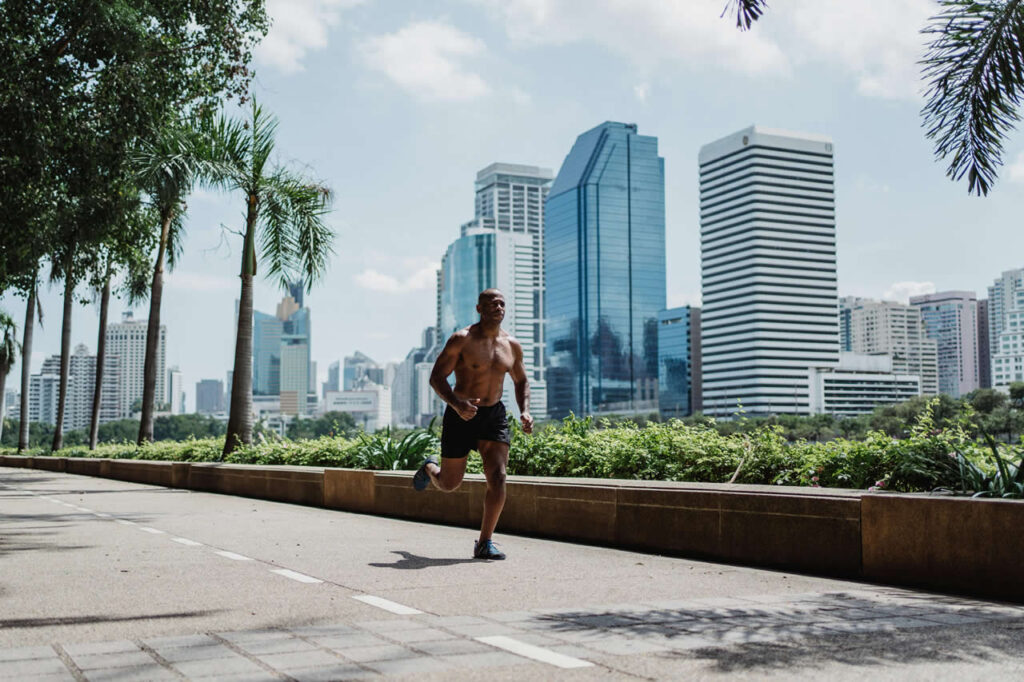
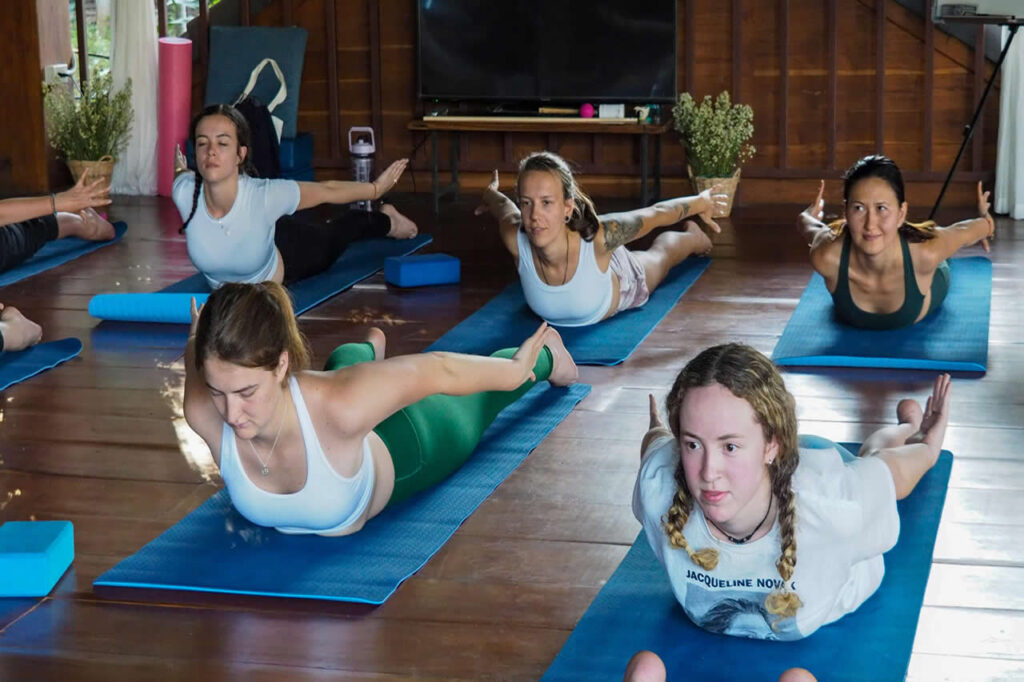
Scuba Diving
- Introductory dive: ฿2,500–฿4,500 (e.g., Koh Tao, Phi Phi Islands, Similan Islands)
- PADI Open Water Certification: ฿10,000–฿15,000
- Fun dives (for certified divers): ฿1,500–฿3,500 per dive
Surfing
- Board rental: ฿200–฿500 per hour (e.g., Kata Beach in Phuket, Koh Phayam)
- Surf lessons: ฿1,500–฿3,000 per session
- Buying a surfboard: ฿8,000–฿30,000
Tennis
- Public court rental: ฿200–฿500 per hour
- Private lessons: ฿800–฿2,500 per hour
- Club membership: ฿5,000–฿50,000 per year
Badminton
- Court rental: ฿100–฿300 per hour (e.g., Badminton Academy Bangkok, Chiang Mai Badminton Club)
- Shuttlecock & racquet rental: ฿50–฿150 per session
- Coaching: ฿500–฿1,500 per hour
Yoga & Pilates
- Drop-in classes: ฿300–฿800 per session (e.g., Yoga Elements Bangkok, Sumalee Yoga Phuket)
- Monthly memberships: ฿2,500–฿8,000
- Private sessions: ฿1,500–฿3,000 per session
📌 Thailand offers sports for all budgets, from casual weekend activities to high-end training programs. Whether you’re looking for adventure sports, traditional fitness, or something more relaxing like yoga, Thailand has options in every major city.
Healthcare
Hospital Visits
- Public hospitals: 100–500 THB ($3–$15) for a basic consultation.
- Private hospitals: 1,000–3,000 THB ($30–$90) for a doctor’s visit.
- Emergency care & surgeries: Can cost thousands of dollars without insurance.
Medical Insurance
- Basic local insurance: Starts at 20,000–50,000 THB/year ($550–$1,400).
- International insurance: Costs 50,000–200,000 THB/year ($1,400–$5,500) depending on coverage.
- Premium plans with worldwide coverage are more expensive but offer better flexibility.
Private hospitals offer world-class care — but it comes at a price. Learn how to protect yourself financially and compare expat-friendly plans in my full Thailand Health Insurance Guide.
Nanny – Maid
Hiring domestic help in Thailand is common and relatively affordable compared to Western countries. Here’s what you need to know:
Maid Services
A maid in Thailand can work on a part-time or full-time basis, depending on your needs. Services typically include:
- Basic cleaning: Sweeping, mopping, dusting, and general tidying.
- Laundry and ironing: Washing clothes and pressing them.
- Dishwashing: Cleaning dishes and kitchen areas.
- Grocery shopping (if requested).
- Cooking (optional, may cost extra).
- Pet care (optional, depends on agreement).
Maid Pricing
- Part-time (1-2 times per week, 4-6 hours per session): ฿300–฿800 per visit.
- Full-time live-out (5-6 days per week, 8 hours per day): ฿12,000–฿20,000 per month.
- Live-in maid: ฿15,000–฿25,000 per month (usually includes accommodation and meals).
- English-speaking maid: ฿20,000–฿40,000 per month, as they are harder to find.
📌 Many expats prefer hiring a live-in maid for convenience. A live-in maid will usually have separate sleeping quarters, and the employer is expected to provide meals and basic necessities.
Nanny Services
Nannies in Thailand can either be live-in or live-out and typically handle childcare duties such as:
- Supervising children: Ensuring safety at home and outdoors.
- Feeding and meal prep: Preparing nutritious meals for the child.
- Diaper changing and bathing (for infants and toddlers).
- Helping with homework and educational activities.
- Playing and engaging in age-appropriate activities.
- Taking children to school or activities.
- Basic house chores related to the child (e.g., washing baby bottles, cleaning play areas).
Nanny Pricing
- Live-out nanny (8-10 hours per day, 5-6 days per week): ฿15,000–฿30,000 per month.
- Live-in nanny (full-time, including evenings if needed): ฿18,000–฿40,000 per month (employer provides accommodation and meals).
- English-speaking nanny: ฿25,000–฿50,000 per month, as bilingual nannies are in high demand.
- Part-time nanny: ฿200–฿500 per hour, depending on experience and language skills.
📌 Many Thai nannies are experienced and well-trained, but those who speak English or have certifications in early childhood education tend to charge higher rates.
✅ Hiring a maid or nanny in Thailand can significantly improve quality of life, offering more free time and assistance with daily tasks. If hiring locally, recommendations from friends or expat groups are the best way to find reliable help.
School Fees
For expat families in Thailand, education is a major expense. There are different types of schools available, each catering to different budgets and language preferences.
Local Thai Schools (Government Schools)
These schools follow the Thai curriculum and are taught entirely in Thai. They are the most affordable option but may not be suitable for non-Thai-speaking children.
- Tuition Fees: ฿3,000–฿15,000 per year (public schools)
- Additional Costs: Books, uniforms, and extra activities may add another ฿5,000–฿20,000 per year.
Bilingual Schools
Bilingual schools offer a mix of Thai and English instruction. They follow the Thai curriculum but incorporate some international elements, making them a middle-ground option for expat families.
International Schools
These schools follow international curricula such as British (IGCSE, A-Levels), American (AP, IB), or other globally recognized programs. They are the best option for expat children but are significantly more expensive.
- Preschool & Kindergarten: ฿150,000–฿400,000 per year
- Primary & Secondary: ฿250,000–฿900,000 per year
- Elite International Schools (e.g., Bangkok Patana, NIST, ISB): ฿600,000–฿1.5 million per year
- Additional Fees: Enrollment fees, uniforms, books, and extracurricular activities can add ฿50,000–฿300,000+ annually.
📌 For a full breakdown of international schools by city, tuition tiers, and how to apply, check out our complete guide to International Schools in Thailand.
Daycare & Nurseries
For younger children, daycare and early childhood centers are available in cities like Bangkok, Chiang Mai, Phuket, and Pattaya.
- Local Daycare Centers: ฿5,000–฿15,000 per month
- International/Bilingual Nurseries: ฿15,000–฿50,000 per month
Homeschooling & Alternative Education
Some expats choose homeschooling, either independently or through online accredited programs. Costs can vary but typically range from ฿50,000–฿300,000 per year, depending on curriculum and resources used.
📌 For a deeper dive into schools, healthcare, daily routines, and real-life parenting stories, check out the full guide: Parenting in Paradise: Raising Kids in Thailand as an Expat
Small Holidays
Thailand is a fantastic place for quick getaways, whether to a tropical island, mountain retreat, or cultural city. Here’s what you need to know about the cost of short holidays, covering transportation and accommodation.
📌 Need inspiration on where to go? Check out my curated list of the Best Places to Visit in Thailand, featuring 35 handpicked spots and an interactive map to help you plan.
Transportation Costs
Flights
Domestic flights in Thailand are generally affordable, except for Koh Samui, which has higher prices due to Bangkok Airways’ monopoly on the route.
- Bangkok to Chiang Mai/Phuket/Krabi: ฿1,000–฿3,500 (one way, economy)
- Bangkok to Koh Samui: ฿3,500–฿7,000+ (one way, economy) due to limited airline options
- Chiang Mai to Phuket: ฿1,500–฿4,000 (one way, economy)
📌 Booking in advance or during promotions can significantly reduce prices.
Buses & Trains
Buses and trains are more budget-friendly options for land travel.
- Bangkok to Chiang Mai (VIP Bus): ฿500–฿1,200
- Bangkok to Phuket (VIP Bus): ฿700–฿1,500
- Bangkok to Hua Hin (Train): ฿150–฿450
- Bangkok to Chiang Mai (Train, Sleeper Class): ฿800–฿1,500
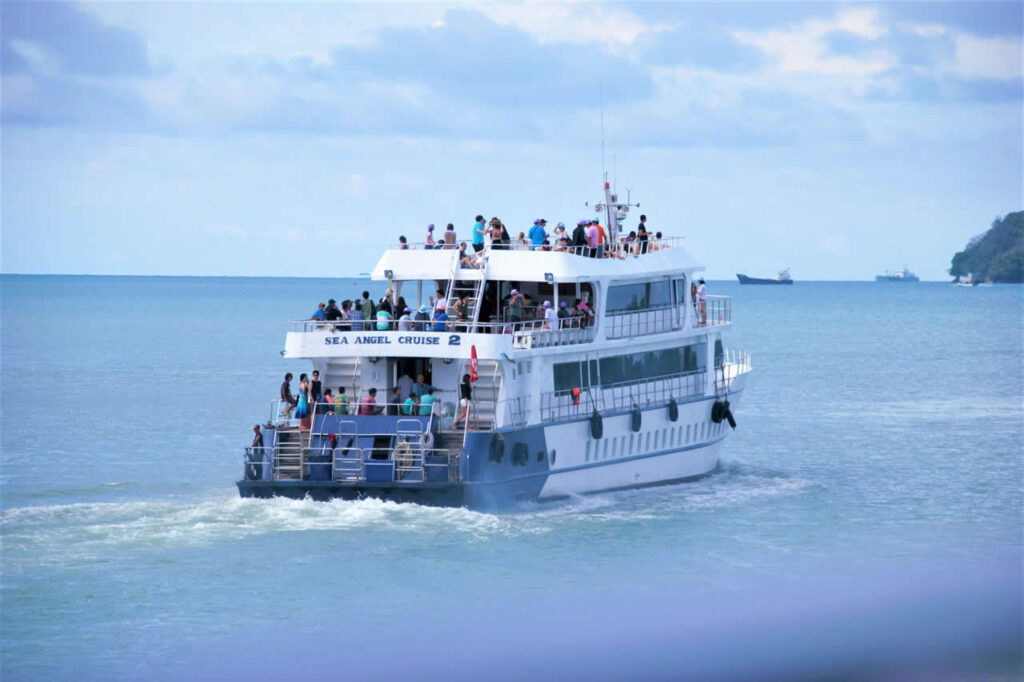

Ferries & Speedboats
To reach islands, ferries and speedboats are common.
- Phuket to Koh Phi Phi: ฿400–฿800 (ferry), ฿1,000+ (speedboat)
- Krabi to Koh Lanta: ฿500–฿1,200
- Surat Thani to Koh Samui: ฿150–฿600 (ferry), ฿1,000+ (speedboat)
Accommodation Costs
Thailand offers a wide range of accommodations, from budget guesthouses to luxury resorts.
Budget Accommodation (Guesthouses & Hostels)
- Bangkok/Chiang Mai: ฿300–฿800 per night
- Phuket/Koh Samui/Koh Phi Phi: ฿500–฿1,200 per night
- Hua Hin/Pattaya: ฿400–฿1,000 per night
Mid-Range Hotels (3-4 Star Hotels & Resorts)
- Bangkok/Chiang Mai: ฿1,200–฿3,500 per night
- Phuket/Koh Samui/Koh Phi Phi: ฿2,000–฿5,000 per night
- Hua Hin/Pattaya: ฿1,500–฿4,000 per night
Luxury Resorts (5-Star & Private Villas)
- Bangkok/Chiang Mai: ฿4,000–฿15,000 per night
- Phuket/Koh Samui/Koh Phi Phi: ฿7,000–฿30,000+ per night
- Hua Hin/Pattaya: ฿4,000–฿12,000 per night
📌 Many hotels offer discounts for longer stays or during low seasons (May–October).
✅ For a complete overview of transportation, regional price differences, and accommodation rates—plus an interactive tool to calculate your own travel costs—check out the full guide on the Cost of Travel in Thailand.
The cost of living in Thailand is very reasonable and offers great value for money. At only a fraction of Western costs, you can enjoy a perfectly decent lifestyle. Especially as a single (probably younger) person, it is absolutely possible to stay in Thailand on a limited budget and still enjoy yourself.
But it’s a different story for a family having to take things under consideration, such as health insurance and international school fees, which are not exactly cheap in Thailand. Plan your budget wisely, and spend accordingly!
Check out my complete guide covering lifestyle, visas, healthcare, and more The Pros and Cons of Living in Thailand as an Expat
📌 Found this content helpful?
If this helped you budget smarter, a coffee is a simple way to say thanks and keep cost data refreshed for everyone.

Founder of Thrive in Thailand
Long-term expat living in Thailand—sharing culture, insights, and real-life farang wisdom, one story at a time!
💬 Would you live in Thailand on your current budget? What expenses surprise you the most? What’s your biggest cost-saving tip? Share your insights below!

